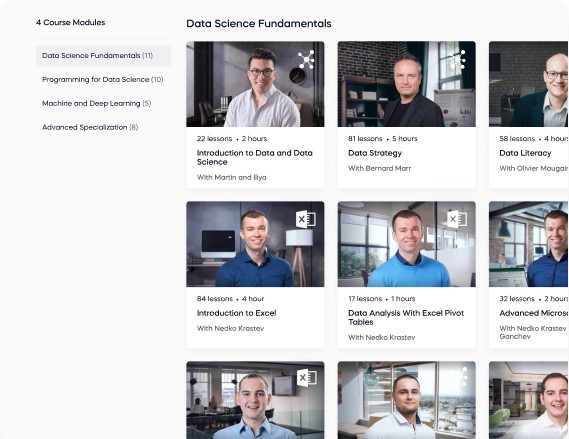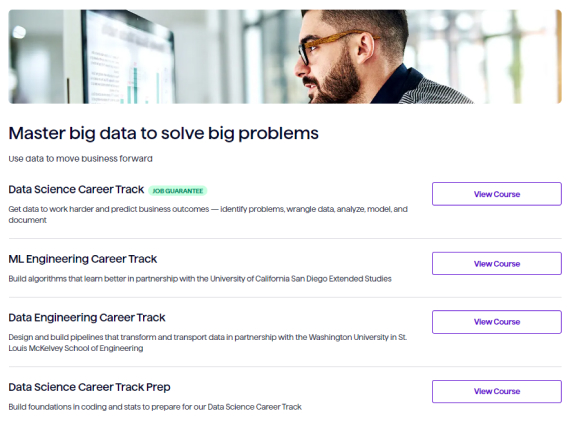Springboard Alternative: 365 Data Science vs Springboard Comparison
Pricing: 365 Data Science vs Springboard Overview
$15.37 per month
Billed annually- Online On-demand Video
- Gamifield Platform
- Comprehensive Portfolio
- Free Plan
- Step-by-Step Curriculum
- Real environment practice
- Personalized learning dashboard
- Career tracks
- Exams
$1,890 per month
billed monthly- Online On-demand Video
- Gamifield Platform
- Comprehensive Portfolio
- Free Plan
- Step-by-Step Curriculum
- Real environment practice
- Personalized learning dashboard
- Career tracks
- Exams
Course Content: 365 Data Science vs Springboard
365 Data Science
The curriculum of 365 Data Science offers three career tracks: Data Scientist, Data Analyst, and Business Analyst. Each track begins with an Introduction to Data and Data Science, setting the foundation for the upcoming concepts and lessons.
Each course is a logical continuation of the previous one and considers skill levels already attained—making 365 Data Science especially ideal for beginners. For instance, you won't need to follow along with repeated explanations merely because the course creators needed to be sure if a particular idea had been covered in earlier lessons. The Data Science career path also delves deeply into the advanced probability concepts required for students to become capable data scientists with computational thinking. The essential statistical principles necessary for working with data are covered in the career tracks.


Springboard
Springboard offers eight career tracks—three of which include Data Scientist, Machine Learning Engineer, and Data Analyst. Students can enroll for these career tracks on specific dates throughout the year. But spots are limited, and candidates are accepted on a rolling basis. All candidates must go through a multi-step application process that ends with an admission technical skill survey that determines if students are eligible for enrollment. Therefore, beginner data science students may opt for the Springboard prep course or Foundations to Core springboard courses which require no prerequisites and follow a similar structure to the Springboard career tracks.
Regarding content, Springboard and 365 Data Science are on the same page. Both curriculums teach essential statistical concepts, data visualization, and machine learning techniques—data wrangling in a structured fashion.
While both e-learning platforms teach data visualization, the Springboard Data Science Career Track covers data visualization in Python only, while 365 Data Science’s The Complete Data Visualization Course teaches data visualization in Python, Excel, Tableau, and R.
Key Features: 365 Data Science vs Springboard
Learning Platform
365 Data Science acknowledges students’ difficulties with online learning, such as a lack of engagement, accountability, motivation, and fun. The platform includes gamified elements that promote wholesome learning practices to solve these concerns. It also provides an XP system, newsfeed, collecting cards, leaderboard, and other features—in addition to the typical learning dashboard where you establish goals and monitor your progress.
On the other hand, Springboard does not offer gamified features that make your learning experience more fun, engaging, and competitive.
Learning Material
Learning materials help students assimilate the subject matter quicker and in ways that course videos cannot. 365 Data Science offers downloadable resources that can be stored on your computer and accessed offline.
- In addition to exercise files with videos, 365 Data Science provides a variety of other resources to satisfy the needs of students, including: Course Notes – free PDF text documents that highlight the key concepts from a particular course.
- Templates: code-ready templates that speed up your process and cut down on online browsing time.
- Infographics: PDF documents with eye-catching pictures that assist newcomers in explaining the big picture of the challenging discipline of data science.
On the other hand, Springboard does not offer downloadable learning material that students can use offline. They do provide practice exercises, career-related coursework, and articles.
Real Environment Practice
Although less practical than in-browser coding—which allows students to transition from video to coding seamlessly—the advantages of developing your skills in a real-world environment far outweigh the disadvantages. All businesses assume you will create your own program and identify workable solutions to problems. Additionally, this approach demonstrates how to solve problems when browser-based code cannot handle massive datasets.
Practical Case Studies
365 Data Science emphasizes the business application of data science in its practical case studies. It offers helpful case studies where students can put what they've learned into practice in a real-world setting.
For instance, the Probability Course in 365 Data Science gives you access to the FIFA 19 player stats dataset. As a head product manager—applying continuous distribution concepts—you must determine whether the game is well-balanced and enjoyable.
365 Data Science highlights the business application of data science in its exercises and case studies in courses like Python for Finance.
- Credit Risk Modeling in Python
- Time Series Analysis in Python
- AI Applications for Business Success
Springboard offers multiple mini projects to their career tracks that reinforce the concepts you’ve learned in a practical setting and two capstone projects you can add to your portfolio. An example Springboard capstone project is cryptocurrency price prediction facilitated by article sentiment analysis.
Exams
Exams are ideal for students to gauge how much knowledge they have retained from a given section or course regarding theory and application. Passed exams demonstrate to potential employers that you possess the necessary expertise to perform your job well.
365 Data Science optional practice exams evaluate your understanding of a particular area or chapter of the course. They help you find potentially essential areas for improvement and are an excellent method to prepare for the course exams.
Course assessments are thorough (timed) exams that gauge how much knowledge you have acquired on each course topic.
Career track exams are accessible only once you have completed every course exam in the professional track and assessed your knowledge from every course in the career track.
Springboard does not offer final comprehensive exams equivalent to the career track exam. The only type of examination Springboard provides is their online technical survey skills which students must pass to enroll in a Springboard data science bootcamp.
Certificates
The certifications students receive from online learning platforms after completing a course or career track are key selling points. The data science business places a high value on certificates since they show that the student possesses the character qualities and technical skills required to be a competitive job applicant. 365 Data Science provides industry-recognized certificates that significantly increase students’ chances of landing a data science job. When passing exams with a grade of at least 60%, students can obtain course certificates and career track certificates.
Springboard students receive certificates upon the completion of a Springboard career track. Students must review all the video lessons, course materials, and hands-on projects and pass the capstone project, which your mentor reviews.
Q&A support
365 Data Science provides superb, personalized customer support, and instructors actively participate in responding to queries from the platform's Q&A section. Such assistance is essential for novices and when they require professional guidance.
The Springboard bootcamp also offers an excellent support system for students throughout the six-month learning experience, as students can turn for help to mentors in one-on-one calls. Additionally, they have access to an industry career coach and student advisor from start to course finish.
The potential problem is that students lose access to the Springboard mentorship and other services after six months, while the 365 Data Science Annual Plan gives more flexibility to students with busier schedules.
Student Ratings
365 Data Science and Springboard are well-regarded by students and have positive reviews on Trustpilot. Springboard has 0 ratings on the G2 platform, while 365 Data Science has 4.8/5 from five reviews.
Springboard scores an impressive 4.4/5 stars based on 226 reviews, and 365 Data Science boasts 4.9/5 out of 670 reviews.
Pros and Cons
- One-on-one calls with mentor
- Project-based curriculum
- Career-advice services
- Very expensive
- No graded comprehensive exams
- No downloadable resources
- No free content
- Structured Career Track curriculum
- Comprehensive graded exams
- Instructor-peer help
- Recognized Certificates of Achievement
- No capstone projects
- No one-on-one mentorship
Pricing
365 Data Science provides free content to students who wish to taste the platforms’ teaching styles before deciding on a plan. 365 allows students access to the first chapters of each course and the resources and practice exams in them. In this way, students have an excellent opportunity to decide if they want to upgrade.
Unfortunately, Springboard does not offer free content—meaning students cannot get a preview of Springboard’s teaching style. Springboard courses last six months, and students can pay per month or upfront and save 13% on tuition.
The deferred tuition plan allows students to pay after they start a data science job within six months of graduating, charging $457/month in 36 monthly installments. There is a $700 deposit for enrollment.
- Standart: $1,890/month
- Upfront Discount: $9,900/ billed once
- Deferred Tuition: $457/month
- Free subscription: access to the first few lessons of all courses
- Premium: $36/month or $29/month billed annually
365 Data Science vs Springboard: Which one to choose?
Springboard is a great learning platform that can provide a high-quality data science bootcamp experience to individuals thanks to the access to a support system of mentors, career coaches, teaching assistants, and Springboard student advisors. Like 365 Data Science, the career track-based learning ensures students follow a systematic learning approach. The capstone projects are a significant addition to your portfolio and a great way to practice what you’ve learned.
While 365 Data Science does not provide such a personalized learning style or capstone projects, it compensates for much more accessible content in terms of price and time flexibility. Each professional path is developed methodically—taking you from beginning to high skill levels while strongly emphasizing practical skills. At the end of the career track, you can acquire an industry-recognized certificate to prove your proficiency, giving you an advantage over other job applicants.